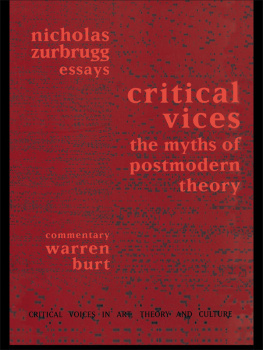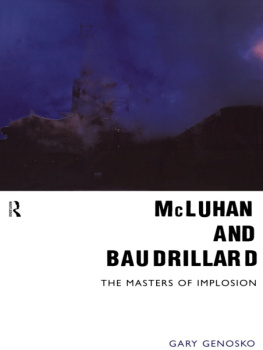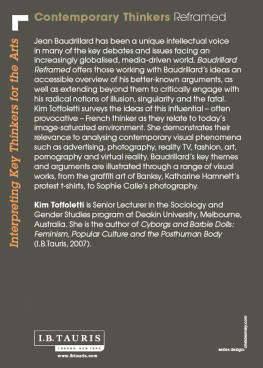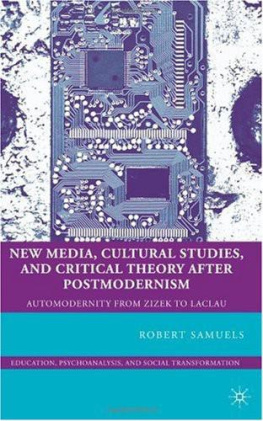ROUTLEDGE LIBRARY EDITIONS: SOCIAL THEORY
Volume 6
BAUDRILLARD
BAUDRILLARD
Critical and Fatal Theory
MIKE GANE
First published in 1991
This edition first published in 2015
by Routledge
2 Park Square, Milton Park, Abingdon, Oxon, OX14 4RN
and by Routledge
711 Third Avenue, New York, NY 10017
Routledge is an imprint of the Taylor & Francis Group, an informa business
1991 Mike Gane
All rights reserved. No part of this book may be reprinted or reproduced or utilised in any form or by any electronic, mechanical, or other means, now known or hereafter invented, including photocopying and recording, or in any information storage or retrieval system, without permission in writing from the publishers.
Trademark notice: Product or corporate names may be trademarks or registered trademarks, and are used only for identification and explanation without intent to infringe.
British Library Cataloguing in Publication Data
A catalogue record for this book is available from the British Library
ISBN: 978-0-415-72731-0 (Set)
eISBN: 978-1-315-76997-4 (Set)
ISBN: 978-1-138-78203-7 (Volume 6)
eISBN: 978-1-315-76383-5 (Volume 6)
Publishers Note
The publisher has gone to great lengths to ensure the quality of this reprint but points out that some imperfections in the original copies may be apparent.
Disclaimer
The publisher has made every effort to trace copyright holders and would welcome correspondence from those they have been unable to trace.
Baudrillard
Critical and Fatal Theory
Mike Gane
First published 1991
by Routledge
11 New Fetter Lane, London EC4P 4EE
Simultaneously published in the USA and Canada
by Routledge
a division of Routledge, Chapman and Hall Inc.
29 West 35th Street, New York, NY 10001
1991 Mike Gane
Printed and bound in Great Britain by Mackays of Chatham PLC, Kent
All rights reserved. No part of this book may be reprinted or reproduced or utilized in any form or by any electronic, mechanical, or other means, now known or hereafter invented, including photocopying and recording, or in any information storage or retrieval system, without permission in writing from the publishers.
British Library Cataloguing in Publication Data
Gane, Michael, 1943
Baudrillard: critical and fatal theory
1. French Philosophy. Baudrillard, Jean
I. Title
Library of Congress Cataloging in Publication Data
Gane, Mike.
Baudrillard: critical and fatal theory / by Mike Gane.
p. cm.
Includes bibliographical references and index.
1. Baudrillard, Jean. 2. SociologyFranceHistory. 3. Postmodernism. I. Title.
HM22. F8B383 1991
301. 0944dc20
9049946
CIP
ISBN 0415037743
ISBN 0415037751 pbk
For N.B.G.
Contents
I would like to thank all the many people with whom I have discussed and argued issues raised in this book, but especially Chris Rojek of Routledge who initially pursuaded me of the importance of the project and who offered encouragement throughout; also friends and colleagues at Loughborough University, in the Department of Social Sciences and the Department of European Studies, who have provided expert opinion and critical commentary.
I have also given a paper on Baudrillard to seminars at Essex University and Edinburgh University, and to the Discourse and Rhetoric Group at Loughborough University and would like to thank these seminars for their debates. I have also discussed these issues with colleagues on the editorial board of the journal Economy and Society, especially Beverley Brown and Ali Rattansi. I would like to thank Monique Arnaud, not only for help with French translations, but also with essential critical discussion on all aspects of this project. Finally, I would like to thank Jean Baudrillard for generously responding to my queries.
As is customary and essential, it is necessary to stress that responsibility for any error of fact or interpretation is entirely mine.
The tangled web of hatreds, of complicities, of rivalries between different schools of thought and of changes in mood causes each atom in the intellectual world to prefer itself, while all the atoms detest each other. The fact that certain disconcerting effects of beauty and truth may spring forth from time to time remains a miraculous paradox.
(Baudrillard, 1990c: 88)
To whoever embarks on terrible seas.
Nietzsche (1969:264)
Baudrillards writings vary enormously in range, register, style, complexity. His writing seems to differ markedly from his spoken interviews (which seem in comparison, less forceful, less logical steps of arguments are often passed over, and most noticeably, he often makes concessions which he probably would not make if writing. If an interviewer is corrected yet continues to follow a disputed interpretation, Baudrillard is not likely to put up any determined resistence.) His written work, however, appears to follow lines of argument without concession to their limit. There are, perhaps, two Baudrillards. I became aware of this watching Baudrillard responding to questions from Bernard Pivot on the French television programme Apostrophe, but it is also apparent in Baudrillards interviews (for example, in the recent interview (Baudrillard, 1988), where Baudrillard becomes less assured and will often appear to be pushed into a position he really does not accept, even to the point of putting his own position into question. But a more confident Baudrillard appears in the written texts, when the writing is pushed to the limit and there appear to be no limits to expression or position.)
It is instructive to compare the experience of reading Baudrillard with that of reading the texts of Marshall McLuhan. George Steiner once wrote:
This is not an easy thing to do. (They) are so compounded of novelty, force of suggestion, vulgarity of mind and sheer carelessness that one is quickly tempted to put them aside, the question of how to read McLuhan, of whether reading him is an obsolescent mode of contact, is implicit in McLuhans own work. He sets his readers a perpetual problem: that of reading any further.
(Steiner, 1969:261)
Something of the same feeling occurs to the reader of Baudrillard. It would be possible to argue that Baudrillard is the French McLuhan, or simply is the McLuhan of today (his most recent book is still decisively influenced by him). But who reads McLuhan now? Perhaps Baudrillard will force people to reread a number of writers McLuhan, Nietzsche who are often thought to be unreadable. It is certainly striking that a number of recent writers have disguised their dependence on Baudrillards work as if he were not quite respectable in academic discourse proper (see, for instance, Rundell, 1987; Richman, 1982; Bauman, 1990a).
But how to read Baudrillard? The problem here is that Baudrillards works, as many commentators have noted, have a remarkable unity. There is tension, and out of this there is development. Yet one possible failing in his total project is an abstraction due to the lack of backgrounding, or contextualisation from work to work. As for the English reader, key Baudrillard texts are as yet unavailable in translation and confusion and misinterpretation are high probabilities. In this perspective it is essential that the overall structure of the trajectory of Baudrillards work is established, so that the changes in style, which alter as the strategic dynamic changes, are recognised as an essential element of the message of the project. Baudrillard himself has outlined the nature of this project in his Habilitation statement which is available in English (1988c). And I shall use this as a first guide to the construction of an account of his work.










